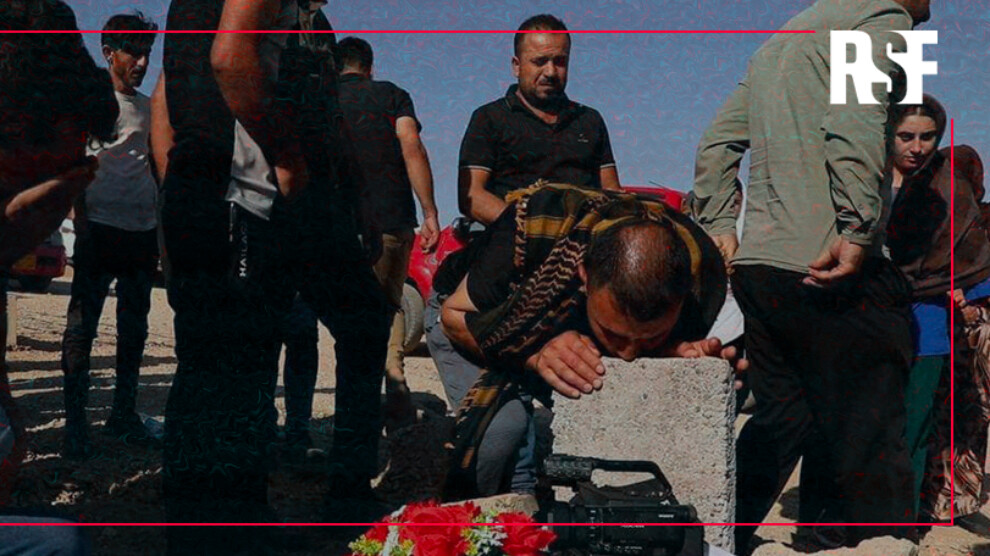RSF alarmed by surge in violence against journalists in Iraqi Kurdistan
Reporters Without Borders (RSF) calls on the Kurdish authorities to protect journalists working in northern Iraq.
Reporters Without Borders (RSF) calls on the Kurdish authorities to protect journalists working in northern Iraq.

Since the end of June, against a backdrop of political tensions in Iraqi Kurdistan, one journalist has been killed by an airstrike, at least five have been detained and another sentenced to three years in prison. Reporters Without Borders (RSF) calls on the Kurdish authorities to protect journalists working in the region.
Medya Kemal Hassan, a 21-year-old TV journalist, is still recovering from the shock of coming under fire from an armed drone on 8 July, when she was wounded in the back and her colleague, Murad Mirza Ibrahim, 27, a fellow employee with the Kurdish media outlet Çira TV, was fatally injured.
They were returning from covering the 10th anniversary of Islamic State’s seizure of Tal Qasab, a village in northern Iraq’s Sinjar (Shengal) district, when the drone opened fire, causing Ibrahim to be thrown from their vehicle. Badly injured, he died three days later.
“I called for help but there was no one there to help me,” she said. “At the checkpoint, I shouted to the soldiers that my colleague was about to die, and they finally agreed to help us.” According to some Kurdish media outlets, the drone that fired on them was operated by Turkish armed forces that have been carrying out operations across the border between Turkey and Iraqi Kurdistan.
Since June, RSF has seen an increase in arrests of Kurdish journalists and violence against them by the various actors present in Iraqi Kurdistan. This is taking place amid growing tension in the run-up to parliamentary elections in the region in October, which is fuelling rivalry between the pro-Turkish ruling Kurdistan Democratic Party (KDP), and the main opposition party, the Patriotic Union of Kurdistan (PUK).
“Iraqi Kurdistan is becoming increasingly dangerous for journalists. The airstrike that killed Murad Mirza Ibrahim more than a month ago remains unpunished. The same goes for violence against journalists by local security forces. We call for an investigation into Ibrahim’s shocking killing. We also call on the Kurdish authorities to end the intimidation and violence for which they are responsible. Journalists in Iraqi Kurdistan must be able to work in complete safety, at a time when political rivalries are peaking,” said Jonathan Dagher, Head of RSF’s Middle East desk.
Spate of arrests of journalists
RSF has observed a surge in press freedom violations since late June, including attacks against journalists, arrests and a conviction, bringing the number of journalists currently detained in Iraqi Kurdistan to three:
3 August: The ruling KDP’s “Asayish” security forces attacked reporter Omed Baroshki and other journalists and activists as they tried to commemorate the eighth anniversary of the death of Wedad Hussein Ali, a Roj News journalist killed on 13 August 2016. The security forces beat Baroshki, handcuffed him and detained him for several hours. A month earlier, Baroshki was the subject of a police warrant ordering him to appear in court in Duhok, a city in the north of Iraqi Kurdistan, on 15 September to stand trial. When arrested on 22 February and then released on bail the next day, he says he was charged under the law on misuse of communication devices, and not the press law.
29 July: Suleiman Ahmed, a Syrian Kurdish journalist who edits the Arabic section of the Kurdish news website RojaNews, was sentenced to three years in prison by a court in Duhok for alleged affiliation to the Democratic Union Party (PYD). Arrested in October 2023 while crossing the border between Syria and Iraqi Kurdistan, Ahmed has been detained arbitrarily in Iraqi Kurdistan ever since.
13 July: Channel 8 reporter Nijyar Mohammed and photo-journalist Behez Akreyi were detained for several hours after being arrested while covering Turkish military advances in the city of Duhok. Murat Yazar, a Rome-based Kurdish photo-journalist with Turkish nationality who won a 2024 Pulitzer Foundation grant, was arrested the same day while working on his documentary project on the Tigris and Euphrates rivers. His family had no news of him for eight days, until his release on the evening of 21 July. “I was under intense psychological pressure due to the promises of imminent release that were repeated every day but did not materialise,” he told RSF.
26 June: Ahmad Shamki, a reporter for the Kurdish news website 7 ROJ, was arrested in Duhok district for allegedly defaming the mayor of the town of Sheladze while investigating the allocation of a public contract. He was released on bail three days later. “The mayor warned me that if I did not drop the investigation within 24 hours, he would file a complaint against me. I refused, explaining to him that I was simply doing my job as a journalist,” he told RSF.
Caught in the crossfire between old rivals
RSF pointed out that: “Since Iraqi Kurdistan won autonomy in 1992, conflicts between the many actors present in the region have increased the threats to journalists. As well as the rivalry between the ruling KDP and opposition PUK, and the armed PKK, these actors include the Baghdad-based Iraqi government, the Kurdish security forces known as the Asayish, and the Turkish armed forces, which are backed by the region’s pro-Turkish political parties. Turkey occasionally launches airstrikes against those they accuse of being “militants” affiliated to the PKK, which Turkey regards as a “terrorist organisation.”